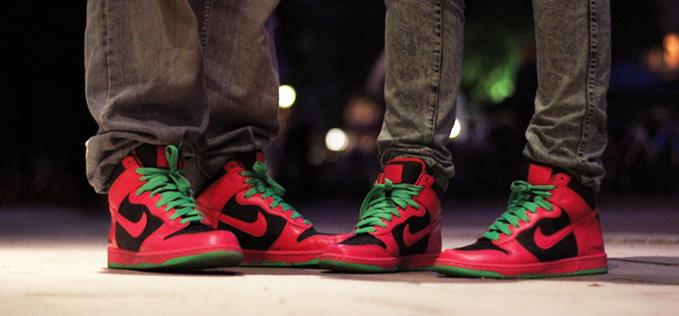WE all know that person who is obsessed with labels: from labelling people to the labels in their clothes. Wearing a brand means you’ve made it. And because you’ve made it, it’s necessary to show the world your carefully curated couture collection on every social platform possible. Brand addicts from London to New York, Paris and Milan unwaveringly worship their designer deity. But what’s in a label?
By the time I was 18, Apple had successfully penetrated my psyche and convinced me that I needed a Mac for university
The reality is we are the reason that label lust is even a reality. Yes, there are the clever marketing monkeys who say ‘If we give Drake an orange Moncler jacket to wear in his new video, all the aspiring roadmen clamouring to be Drake will buy it’: and they’re right. After the Hotline Bling video online sales of the Maya Moncler jacket doubled in a day (and it’s not cheap at $1,150). We buy into the dream. If we own that Moncler jacket, those fresh Supreme limited edition trainers, or that Mulberry bag, we get celebrity endorsement. Yes, we might not have music videos, infinite 'bitches' on speed dial, or a guestlist spot at the hottest bars, clubs and restaurants across the globe, but at least we have that same Moncler jacket.
The biggest irony of it all? The stars we idolise don’t even have to buy the goods, they get them for free because they’re famous. Their bank balances remain unblemished as they walk around in Balenciaga. We, on the other hand, will work overtime for a month of weekends to save for a designer handbag that costs more than a month’s rent.
It could be as simple as this: we like the brand. Guilty. I love Apple. I’ve loved Apple since I bought my first Mac at 16 from eBay, desperately hoping it wasn’t stolen from an unsuspecting commuter. I liked the way it looked (all white, tres chic), the way it worked (before it got too old and froze on me all the time), and the fact that it was really good for editing film. It also happened to be the laptop featured on most of my favourite pubescent TV shows. Did I need the subsequent Macs I bought for college and university? No. By the time I was 18, Apple had successfully penetrated my psyche and convinced me that I needed a Mac for university. I didn’t. I studied law, not design. What started out as a preference became an obsession: the Mac was joined by every iPhone released, and a few iPads. I shamefully admit I am an Apple addict, seeking an Apple Anonymous help group.
 Do you live and breathe brands?
Do you live and breathe brands?A good friend of mine is Nike. Not only does he work for Nike, he lives and breathes Nike. He’s Nike’s best ambassador: Mr Nike, if you will. I’ll send him a screenshot of a pair of trainers I’ve seen, and he will manage to convince me they are a ‘wardrobe staple’. Circa £100 later, I’ll be walking down Market street with a fresh pair of Nikes. But would I like them if they were Adidas rather than Nike? Probably not. Fashion is fickle, and evidently, so am I.
I wouldn’t buy something just because it was branded. I’d have to actually like it, especially if I’m parting with my hard-earned cash to wear it. I also look at high-cost items as an investment: the ‘value per wear’ theory. A theory developed by consumers across the world to justify spending too much money. But it could apply to a £30 pair of shoes in the same way as a £300 pair of shoes. Labels will undoubtedly have more craftsmanship for the pricetag, or at least we would hope so.
I think what it comes down to is this. Do you have your own brand identity? I see myself as a brand. Call it arrogance, call it delusions of grandeur. I wear things and buy things that are distinctly ‘me’. Some of my favourite army camo pieces come from vintage shops, and my character handbags from the kids’ section of department stores. I rarely see another girl wearing my outfit when I go out. And I wear what I wear because it suits me, and I like it. I define my own brand: I don’t let a brand define me. Ultimately, labels are for cans and not people.










